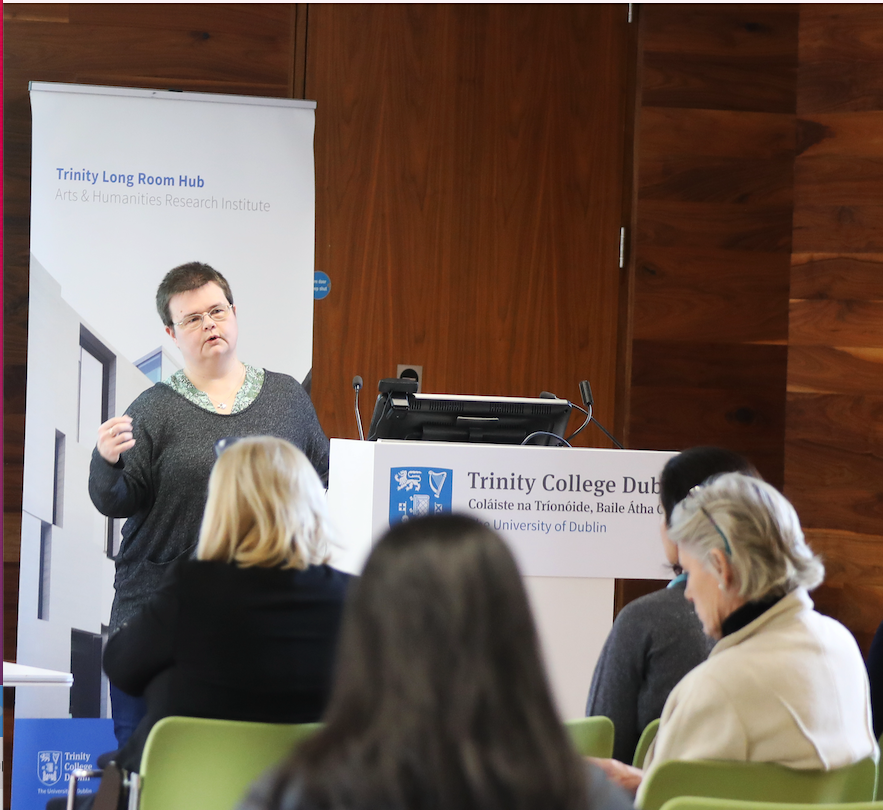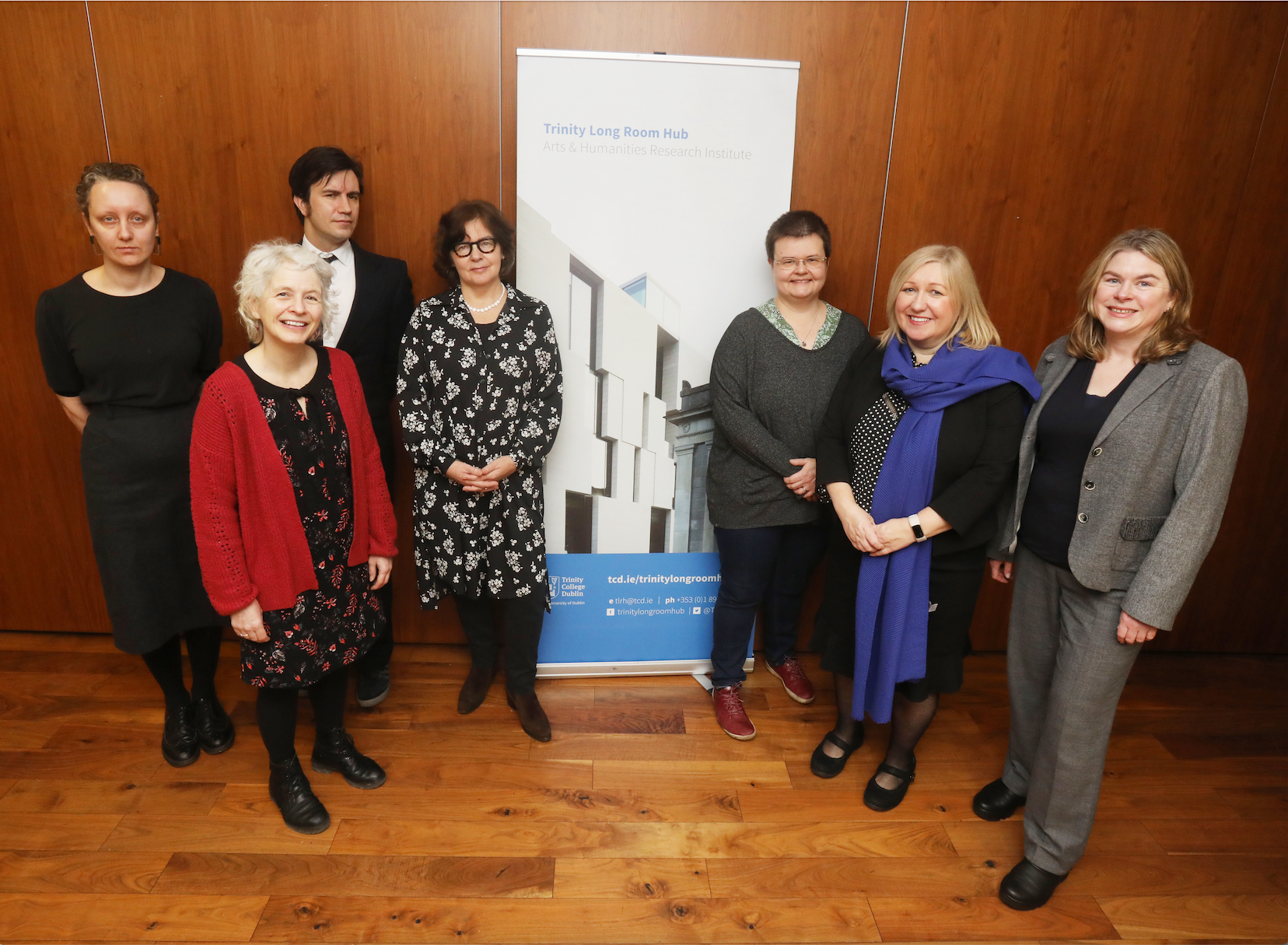Gender and Sex in Research and Innovation: a St Brigid's Day event
The event concept was originally envisioned as part of the set of activities during the week in September when Trinity celebrates research and engagement with the public by way of the European Researchers’ Night initiative. The original brainstormers (Professor Lorraine Leeson, AVPEDI, Dr Doireann Wallace of the Research Development Office, and Dr Nina Shiel, Research Fellow in the TORCH project which is part of the CHARM-EU European University Alliance umbrella), quickly realised that our vision and the material available to us would do more justice to the topic as a more extensive event. We settled on 1 February, St Brigid’s Day, as this was going to be the first year of the official public celebration of the remarkable goddess and saint Brigid and we felt that not only was the topic appropriate for the day but that she would most certainly approve!
Our friends in the Trinity Long Room Hub kindly agreed to host the event in their beautiful space and to support it every way, for which we are very grateful. We were delighted to secure a wonderful interdisciplinary panel of enthusiastic colleagues: Professor Cliona O’Farrelly (School of Medicine), Professor Gillian Wylie (School of Religion, Theology and Peace Studies) and Professor Brian Caulfield (School of Engineering). The event was chaired by Patrick Lansley from the Research Development Office.
The event was opened by Professor Leeson together with Professor Eve Patten, the Director of the Trinity Long Room Hub, as they reflected on why it is still necessary to continue the conversation on sex and gender in research, and how their own lives have been affected by being female researchers. Each highlighted the importance of a supportive community as well as the key role of mentors and other role models. While these are elements that are particularly pronounced for minority and disadvantaged groups, it is worth emphasising that everyone benefits from a good, open and encouraging community and from availability of mentors. Although many initiatives that are framed in terms of championing minorities can encounter resistance, in the end they often end up improving the entire community.
 Dr Shiel gave an overview of her work in the TORCH project concerning analysing the current policies and the level of available supports regarding gendered research and innovation across the five founding CHARM-EU institutions: University of Barcelona, Trinity College Dublin, Utrecht University, University of Montpellier and Eötvös Loránd University in Budapest. The primary findings indicate that while each institution has strong gender-related policies in place or in development, these tend to be oriented towards straight cis women academics and researchers, with the presumption that motherhood will be the biggest obstacle in their working lives. Current or developing policies on the expression, recording and facilitating of gender minorities (trans, non-binary, etc) are to be found only in two of the five member institutions, while the level of support available to LGBTQI+ colleagues varies from institution to institution. Further, gender issues tend to be considered in isolation, with little intersectional work incorporated.
Dr Shiel gave an overview of her work in the TORCH project concerning analysing the current policies and the level of available supports regarding gendered research and innovation across the five founding CHARM-EU institutions: University of Barcelona, Trinity College Dublin, Utrecht University, University of Montpellier and Eötvös Loránd University in Budapest. The primary findings indicate that while each institution has strong gender-related policies in place or in development, these tend to be oriented towards straight cis women academics and researchers, with the presumption that motherhood will be the biggest obstacle in their working lives. Current or developing policies on the expression, recording and facilitating of gender minorities (trans, non-binary, etc) are to be found only in two of the five member institutions, while the level of support available to LGBTQI+ colleagues varies from institution to institution. Further, gender issues tend to be considered in isolation, with little intersectional work incorporated.
These scene-setting talks were followed by Dr Wallace, who is a specialist in interdisciplinary research development and funding, and who presented funder perspectives on gender and sex in research and innovation. This included the aims and actions towards gender equality in R&I present in the policies and priorities of the national and European funders. As a case study she presented Horizon Europe gender policy and practice, in which gender equality is set as a crosscutting principle, with the goal of eliminating systemic gender inequality, and intersecting socio-economic inequalities within the European R&I ecosystem. Tools towards this goal include the requirement of institutional gender equality plans as an eligibility criterion for European Commission funding, gender balance in consortia as a deciding factor between equally ranked proposals, requirement to address gender in the methodology section of a proposal, as well as additional EC initiatives such as funding for gender-specific actions and flagship measures with targets for women in business.
The engaging panel began with Professor O’Farrelly’s reflection on her career journey to her current position as Professor of Comparative Immunology. She returned to the importance of mentorship and emphasised that mentors and role models need not be the same gender as the mentee, although this is often assumed as the most effective pathway. Support from allies can be crucial along the way.
 Professor Wylie presented the H2020 project PAVE, in which she is a participant, as an example of sex and gender in research and innovation. The project investigates root causes and driving factors of violent extremism. She demonstrated how gender analysis was incorporated into the project from the start and how it has remained a cross-cutting guiding element throughout the project lifecycle. In the conceptual framework, gender is included as a factor in vulnerability to violent extremism by way of societal context, ideology, identity and emotion. The final synthesis showed that gender shaped each of five emergent themes: war legacies, state enablement, education, religious institutions, on and off-line media and transnational linkages.
Professor Wylie presented the H2020 project PAVE, in which she is a participant, as an example of sex and gender in research and innovation. The project investigates root causes and driving factors of violent extremism. She demonstrated how gender analysis was incorporated into the project from the start and how it has remained a cross-cutting guiding element throughout the project lifecycle. In the conceptual framework, gender is included as a factor in vulnerability to violent extremism by way of societal context, ideology, identity and emotion. The final synthesis showed that gender shaped each of five emergent themes: war legacies, state enablement, education, religious institutions, on and off-line media and transnational linkages.
Professor Caulfield, joining us via remote connection, talked about the impact of gender in design and mobility. He referred to a report titled Travelling in a Woman’s Shoes. Understanding Women’s Travel Needs in Ireland to Inform the Future of Sustainable Transport Policy and Design commissioned and published by Transport Infrastructure Ireland (TII). The report points out that Irish women’s mobility is hindered by existing family gender dynamics that largely place the burden of care onto women, as well as women feeling unsafe in public, particularly when walking and using public transport. Mobility issues have direct relevance to working lives, including research careers: even if you choose to work late, do you feel that you will be safe during your journey home? If you do fieldwork, how will you get around and will you feel safe doing so?
We concluded with a Q&A session and a group discussion. In Trinity, we can be proud of the work done so far in relation to gender in supports and in research, but much still remains to be done – and it is a fact that as we learn more, the more and more often we need to evaluate and update our policies and practices. A good example of this is the Athena SWAN certification, and the current efforts coordinated by the Equality Office to put together an application for the institutional Silver status, upgrading from the current Bronze. As we work towards greater inclusion, we must remain aware of two related challenges: to strive for an intersectional approach in order to consider factors that add to and modify gender-based disadvantages; and to ensure that we do not intentionally or unintentionally exclude. As noted above, a more equal environment should improve the experience for everyone, and to go a long way towards the Provost’s goal of Trinity being a Good University.

